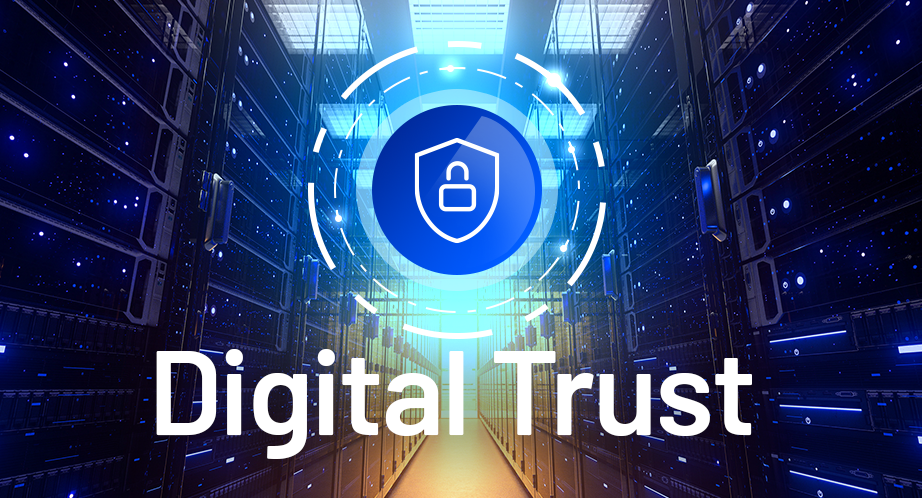What do you think when you hear the term digital trust? While it is often associated with online activities, many still find its true definition unclear.
Ascertia is a global leader in high-trust products and services. Alongside our global community of partners, we help companies establish and maintain long-term digital trust. But what exactly does that mean? Let us explain.

What is digital trust?
According to Jeffery Ritter, University of Oxford, digital trust is:
The confidence users have in people, technology and processes’ ability to create a secure digital world.
Digital trust is granted to companies that demonstrate their ability to provide safety, privacy, security, reliability, and uphold strong data ethics within their online programs or devices.
Digital trust isn’t just about perception. It is underpinned by robust, standards-based infrastructure. Public Key Infrastructure (PKI), for example, is a foundational element in enabling secure digital identities, digital signatures, encryption, and trusted timestamping — all critical to a secure digital experience.
More broadly, digital trust reflects confidence that an organisation can uphold data integrity, meet regulatory obligations, and maintain ethical practices across its digital operations.
Why is it important to establish digital trust?
In an increasingly interconnected world, very few businesses operate completely offline. Establishing digital trust provides a wealthis no longer optional. It’s essential. Doing so offers several strategic benefits:
- Builds customer loyalty – Customers want to feel confident that their data is being handled responsibly and ethically.
- Reduces cybersecurity risks – Digital trust is built on strict security practices, which makes organisations more resilient against threats.
- Facilitates innovation – Trust fosters the safe exchange of ideas, data, and services, allowing businesses to innovate and scale.
- Improves profitability – Companies prioritising digital trust often see increased customer acquisition and retention.
In a recent webinar, Ascertia Chief Product Officer Mike Hathaway reinforced that digital trust is becoming a non-negotiable for cross-border business. Regulations like eIDAS 2.0, FIPS, and others require higher assurance levels for electronic interactions, making digital trust a strategic advantage.
How to establish digital trust
We’ve outlined what digital trust is and why it matters. But how do organisations actively build and maintain it?
To establish digital trust with customers, clients, and partners, focus on the following key pillars:
- Online user experience
- Transparency
- Reliability
- Security
- Compliance and governance
Providing a positive online user experience
From login to checkout, users expect frictionless interactions. This means intuitive design, mobile responsiveness, fast load times and error-free processes, all secured with strong PKI encryption.
Transparency
Being transparent about data usage is a core tenet of trust. Users want clarity on how their information is processed, stored and protected.
We can’t stress enough the need to communicate clearly about consent, privacy policies, and how your organisation adheres to international data standards. This transparency reinforces your credibility.
Reliability
Trust is quickly eroded if systems are unreliable. Whether it’s a service outage, broken signature validation, or delays in transaction processing, users expect services to function exactly as promised.
PKI-based solutions, such as certificate-based digital signatures, help ensure the authenticity and non-repudiation of transactions, which are vital for reliable digital interactions.
Security
Cybersecurity is more than just a technology layer. It’s a fundamental mechanism of digital trust.
The webinar highlighted the role of qualified trust services, cryptographic hardware, and certified secure elements in maintaining robust security. These aren’t just technical details. They are all elements that make digital trust provable. Implementing strong certificate-based authentication, timestamping, and secure digital signatures is crucial.
Compliance and digital trust infrastructure
To fully establish digital trust, organisations must build on recognised digital trust ecosystems, underpinned by PKI, Trust Service Providers (TSPs), and increasingly, Qualified Trust Service Providers (QTSPs).
eIDAS 2.0 and similar global frameworks drive businesses toward verifiable digital identity, qualified electronic signatures (QES), and cross-border interoperability. Implementing compliant solutions is more than a box-ticking exercise. It’s a commitment to digital integrity.
The future of digital trust
As digital ecosystems continue to evolve, so too does the concept of digital trust. The webinar emphasised that digital trust is not static. It is an ongoing commitment that must adapt to technological shifts, regulatory developments, and user expectations.
Key trends shaping the future include:
- eIDAS 2.0 and the European Digital Identity Wallet
The next evolution of the eIDAS regulation places even greater emphasis on qualified digital identity, wallet-based credentials, and cross-border interoperability. Businesses operating in or serving European markets must align with these frameworks to remain competitive and compliant. - Decentralised identity (DID)
The rise of decentralised identity models will give users more control over their personal data while maintaining trust through verifiable credentials and blockchain-based trust registries. This shift challenges traditional centralised identity models and will require updates to trust infrastructures. - AI and trustworthiness
As AI systems are embedded into digital services, questions of algorithmic transparency, data integrity, and auditability become central to digital trust. Organisations will be expected to prove not only that their systems are secure, but that their automated decisions are fair and explainable. - Post-quantum cryptography (PQC)
With quantum computing on the horizon, the foundations of today’s cryptography are being re-evaluated. Future-proofing trust services means transitioning to quantum-safe algorithms and updating PKI infrastructures accordingly. - Continuous validation and dynamic trust
Static trust models are being replaced by real-time validation, continuous authentication, and dynamic risk assessments. This will redefine how trust is established and maintained across digital transactions, especially in high-assurance sectors. Ascertia actively supports these developments, ensuring our PKI-based solutions, trust services, and digital identity products evolve alongside global standards, preparing businesses and governments for the next era of secure digital trust.
Establishing digital trust with Ascertia
Global enterprises and governments rely on Ascertia’s Global Digital Trust Ecosystem to achieve and maintain digital trust at scale.
Our solutions provide the PKI infrastructure, certificate authority services, signature creation devices, and timestamping authorities that power TSPs, QTSPs, and enterprise digital workflows.
Whether it’s securing e-signatures, validating identities, or ensuring compliance with eIDAS, ETSI, and other global standards, Ascertia enables organisations to confidently operate in a trust-focused digital world.
Our digital trust products and services don’t just secure online businesses. They provide certainty, integrity, and peace of mind to all parties involved in digital interactions.


